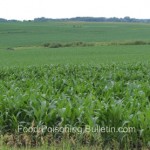Did you know that weather-related power outages have increased by 67% since 2000? Aging infrastructure and climate change are stressing our power grid. Because of the increased energy demand, some power grids can experience blackouts. And of course, severe weather can cause extended power outages. Brownouts can also occur when electric providers ask consumers to voluntary conserve energy or a reduced flow of electricity will be scheduled. So learn how you can stay food safe during temporary power outages. To stay food safe, always keep and appliance thermometer in both your refrigerator and freezer to make sure that the temperature stays below 40°F in the fridge and below 0°F in the freezer. Food will stay at a safe temperate run the fridge up to four hours during a power outage. In … [Read more...]
Climate Change Increases Foodborne Illness Outbreak Risk
The effects of climate change are stark and worrying. Most people have heard about rising sea water levels, more wildfires, and more extreme weather events. But did you know that climate change increases foodborne illness outbreak risks? A study published in Scientific Reports by Kuhn et al looks at the relationship between Campylobacter outbreaks and climate in Northern Europe. The researchers used national surveillance data of campylobacteriosis infections in Denmark, Finland, Norway, and Sweden. They found that temperature, rainfall, and snowfall have a predictable effect on infection rates. Higher temperatures and heavier rainfall led to more infections, while shorter heatwaves and winter rain and snowfall reduced the number. Global climate change will change temperatures and … [Read more...]
Climate Change Increasing Vibrio Infections
A study published in Proceedings of the National Academy of Sciences has found that climate change is increasing the incidence of Vibrio infections in the United States. Long term ecological data analysis has found that climate change is affecting marine animal, plant, and fungi populations. Marine prokaryotes (single celled organisms), the largest living biomass in the world's oceans, play a fundamental role in maintaining life on the planet. Evidence has been found that, for the first time, provides a link between climate variability in the North Atlantic and the presence and spread of marine Vibrios, one of the ocean's prokaryotes. Several species of Vibrio bacteria are responsible for infections in animals and humans. Humans acquire Vibrio infections by eating raw or … [Read more...]
USDA Warns Climate Change Will Affect Global Food Security
The USDA has released a scientific assessment that states climate change is going to hinder progress on reducing undernourishment of people around the world in the next few decades. Climate change will also affect U.S. customers by changing the types of food imported from other parts of the world and their prices. As the climate changes, growing zones change and farmers are going to have to adapt. The report, stated "Climate Change, Global Food Security, and the U.S. Food System" was released to coincide with the climate change talks currently taking place in Paris. Food security is defined as having reliable access to a sufficient quantity of nutritious food that is affordable to the general population. The food must be available, accessible, stable, and the population must be able to … [Read more...]
Climate Change Making Food Less Nutritious
A study published in the journal Nature has found that climate change is making our food less nutritious. Legumes, corn, wheat and rice are primary sources of zinc and iron. When those crops are grown under field conditions at CO2 concentrations predicted for the middle of this century, about 40 years away, they have significantly lower concentrations of zinc and iron, two essential nutrients. Scientists say these deficiencies will cause a loss of 63 million life-years annually across the globe. Life-years are a measure of disease burden, expressing the years lost to illness, disability, and early death. Dr. Samuel Myers, lead author of the study said, "rising concentrations of carbon dioxide in the atmosphere are threatening global human nutrition by reducing the amounts of very … [Read more...]
Report Links Climate Change and Food Insecurity
A new report released by Center for Food Safety's Cool Foods Campaign states that food security is jeopardized by climate change. The report is called Food and Climate: Connecting the Dots, Choosing the Way Forward. Climate change creates extremes in weather, from temperatures that are much hotter and cooler than normal, and rain and snow amounts that are much lower or greater than normal. In 2012, for instance, droughts and heat waves affected 80% of agricultural land, causing $30 billion in damages. California is now experiencing its worst drought in its 153 year history. That state produces almost half of the country's fruits and vegetables. Food prices are expected to rise significantly this year as a result of this climate catastrophe. Climate change is also causing earlier … [Read more...]
Climate Change May Affect Food Poisoning Outbreaks
Scientists predict many consequences to climate change, such as changes in weather patterns and severity of storms. But a new report titled Assessing the Potential Impacts of Climate Change on Food and Waterborne Diseases in Europe ties climate change to increases in food poisoning outbreaks. The report is an assessment of 741 peer-reviewed publications, reports, and scientific sources. From these, the researchers found 1653 "key facts" linking food and waterborne illness pathogens with climate variables. Climate scientists say that global mean air temperatures are projected to increase by 1.1 to 6.4 degrees C (2 to 11.5 degrees F) this century. Public health is affected by these changes, such as deaths in heat waves, flooding, and increases in illnesses because of shifting … [Read more...]










